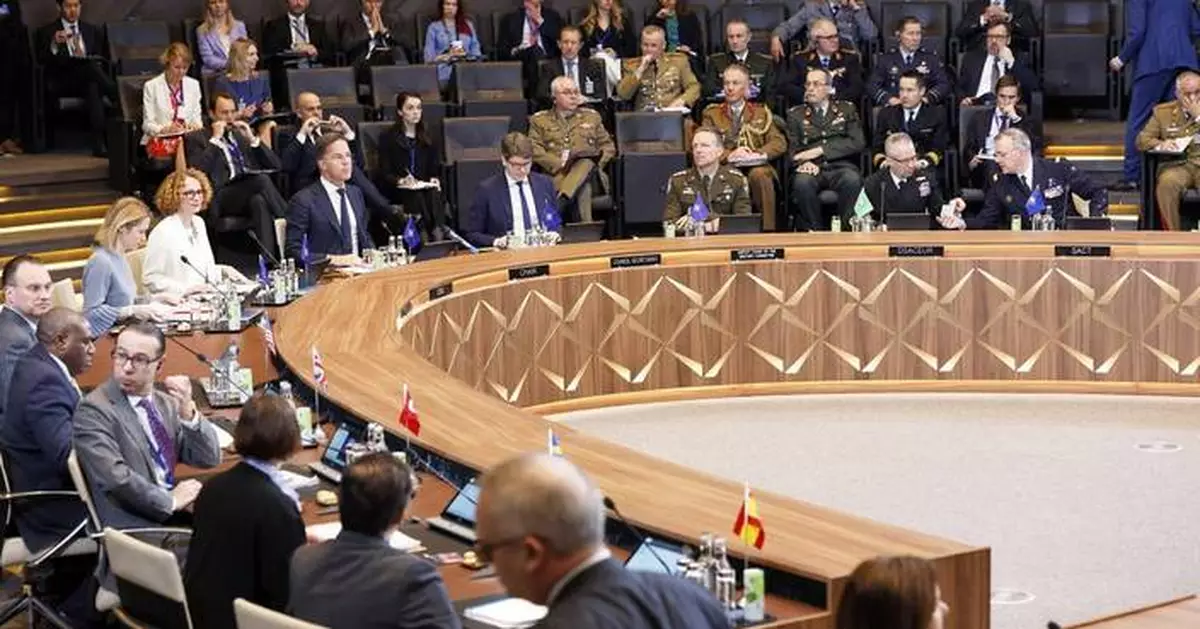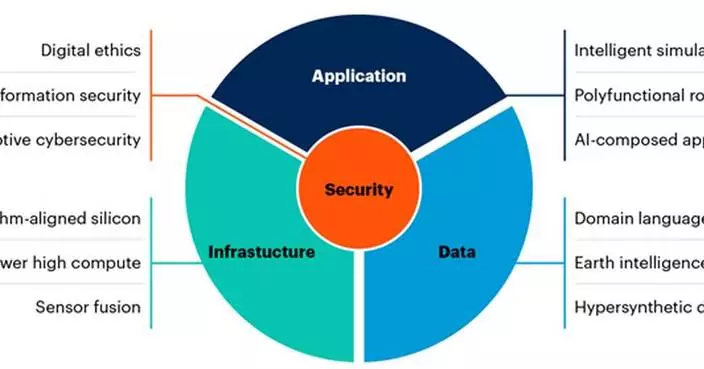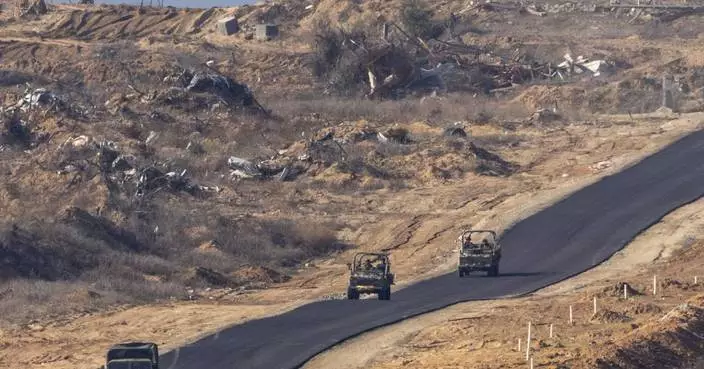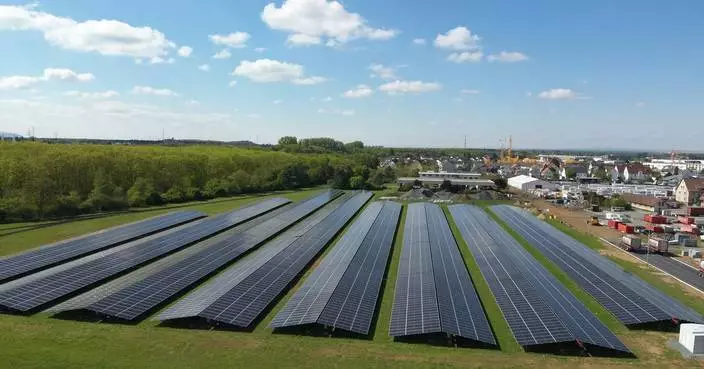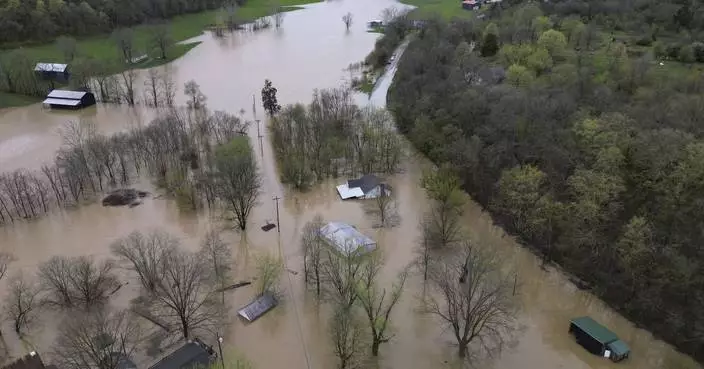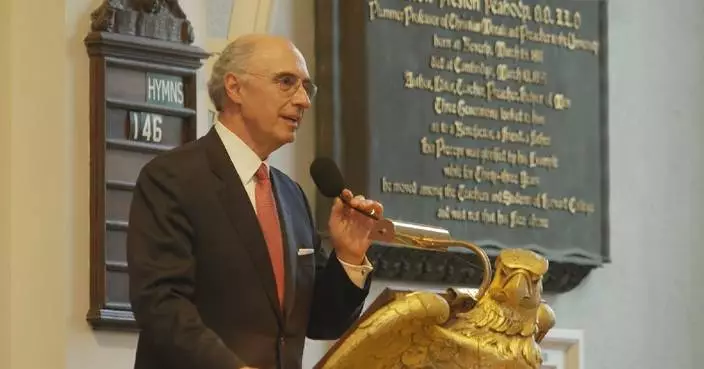BRUSSELS (AP) — European NATO allies and Canada on Friday said they are willing to ramp up defense spending but are cool on American demands for the size of their military budgets, particularly given U.S. President Donald Trump’s readiness to draw closer to Russian leader Vladimir Putin.
U.S. allies have spent billions of dollars more on defense since Putin ordered a full-scale invasion of Ukraine more than three years ago, but almost a third of them still don't meet NATO’s target of at least 2% of their gross domestic product.
Click to Gallery
From left, Czech Republic's Foreign Minister Jan Lipavsky, Croatia's Foreign Minister Gordan Grlic Radman, French Foreign Minister Jean-Noel Barrot, Denmark's Foreign Minister Lars Lokke Rasmussen, Canada's Foreign Minister Melanie Joly, Estonia's Foreign Minister Margus Tsahkna, Bulgaria's Foreign Minister Georg Georgiev and Finland's Foreign Minister Elina Valtonen pose for a group photo of NATO foreign ministers at NATO headquarters in Brussels, Thursday, April 3, 2025. (AP Photo/Virginia Mayo)
U.S. Secretary of State Marco Rubio boards to the plane after his trip in Brussels, Friday, April 4, 2025. (AP Photo/Jacquelyn Martin, Pool)
U.S. Secretary of State Marco Rubio talks with Belgians police officers before his departure, in Brussels, Friday, April 4, 2025. (AP Photo/Jacquelyn Martin, Pool)
From left, French Foreign Minister Jean-Noel Barrot, Germany's Foreign Minister Annalena Baerbock, NATO Secretary General Mark Rutte, United States Secretary of State Marco Rubio, Italy's Foreign Minister Antonio Tajani and Britain's Foreign Secretary David Lammy pose for a group photo during a meeting on the sidelines of the NATO foreign ministers at NATO headquarters in Brussels, Friday, April 4, 2025. (Nicolas Tucat, Pool Photo via AP)
United States Secretary of State Marco Rubio during a meeting on the sidelines of the NATO foreign ministers at NATO headquarters in Brussels, Friday, April 4, 2025. (Nicolas Tucat, Pool Photo via AP)
U.S. Secretary of State Marco Rubio, center, NATO Secretary General Mark Rutte, left, Britain's Foreign Secretary David Lammy speak during a group photo of NATO foreign ministers at NATO headquarters Brussels, Thursday, April 3, 2025. (AP Photo/Jacquelyn Martin, Pool)
French Foreign Minister Jean-Noel Barrot addresses the media during a meeting of NATO foreign ministers at NATO headquarters in Brussels, Friday, April 4, 2025. (AP Photo/Geert Vanden Wijngaert)
Britain's Foreign Secretary David Lammy, center, speaks with Montenegro's Foreign Minister Ervin Ibrahimovic during a meeting of the North Atlantic Council in foreign ministers format at NATO headquarters in Brussels, Friday, April 4, 2025. (AP Photo/Geert Vanden Wijngaert)
From left, Czech Republic's Foreign Minister Jan Lipavsky, Croatia's Foreign Minister Gordan Grlic Radman, French Foreign Minister Jean-Noel Barrot, Denmark's Foreign Minister Lars Lokke Rasmussen, Canada's Foreign Minister Melanie Joly, Estonia's Foreign Minister Margus Tsahkna, Bulgaria's Foreign Minister Georg Georgiev and Finland's Foreign Minister Elina Valtonen pose for a group photo of NATO foreign ministers at NATO headquarters in Brussels, Thursday, April 3, 2025. (AP Photo/Virginia Mayo)
NATO foreign ministers attend a meeting of the North Atlantic Council in foreign ministers format at NATO headquarters in Brussels, Friday, April 4, 2025. (AP Photo/Geert Vanden Wijngaert)
European Union foreign policy chief Kaja Kallas, third left, attends a meeting of the North Atlantic Council in foreign ministers format at NATO headquarters in Brussels, Friday, April 4, 2025. (AP Photo/Geert Vanden Wijngaert)
Trump has said that U.S. allies should commit to spending at least 5%, but that would require investment at an unprecedented scale. According to NATO figures, the U.S. was projected to have spent 3.38% last year, the only ally whose spending has dropped over the last decade.
“It is important that we all agree that Russia is a threat. If not, I don’t know why we should always increase more and more defense spending,” Canadian Foreign Minister Mélanie Joly told reporters at NATO headquarters in Brussels.
NATO leaders said at a summit last year that Russia "remains the most significant and direct threat to Allies’ security.”
Trump’s public rehabilitation of Putin, who had become an international pariah indicted for war crimes, has disturbed U.S. allies, and they believe that the decision to rule out NATO membership for Ukraine weakened Kyiv’s hand at the negotiating table before peace talks have even begun.
Beyond that, Europe and Canada were alarmed last month when the United States split with European allies by refusing to blame Russia for its invasion of Ukraine in votes on three U.N. resolutions seeking an end to the war.
U.S. Secretary of State Marco Rubio said that Washington isn't insisting that its allies hit the 5% spending target overnight, but “we think that’s what NATO allies need to be spending for NATO to face the threats that itself has identified and articulated.”
Rubio said that the extra spending is required to beef up military capabilities.
“We are as involved in NATO today as we have ever been, and we intend to continue to be. But it has to be a real alliance. And that means that our alliance partners have to increase their own capabilities,” he said.
Asked whether that the U.S. would also match the 5% target, Rubio said: “Sure. We’re heading there now.”
France has set itself an “objective of 3%-3.5%, and we are preparing to reach 3%-3.5%, which is about the level of American defense spending,” French Foreign Minister Jean-Noël Barrot said. France was estimated to be spending 2.06% last year.
He said that new funds should be spent on European rather than American equipment. In recent years, European allies placed around two-thirds of their equipment orders with U.S. defense companies.
Even as the Trump administration demands that defense spending be ramped up, the president’s tariff war is roiling stock markets and is likely to damage economic growth around the world, including among U.S. allies at NATO.
Article 2 of NATO’s founding treaty states that allies “will seek to eliminate conflict in their international economic policies and will encourage economic collaboration between any or all of them.”
Asked whether the tariffs constitute a breach of the treaty, NATO Secretary-General Mark Rutte said: “No, I don’t think so. We have seen in the past many examples of differences of view, of fights over tariffs. This has happened before without that being in violation of Article 2.”
Pressed on how allies might provide for their security, if they no longer have budget space, Rutte said: “I don’t think I’m helping this alliance by commenting on something which is not really part of alliance policy, and that is to make sure that we can defend ourselves.”
Norwegian Foreign Minister Espen Barth Eide said that NATO members are working on setting a new spending target, to be announced at the next summit in June.
But he said that “5% is of course much more than the U.S. itself spends and it’s a very high ambition and we are not ready to commit to a number at this time. Just as it’s important to spend more, it’s also important to spend more smartly.”
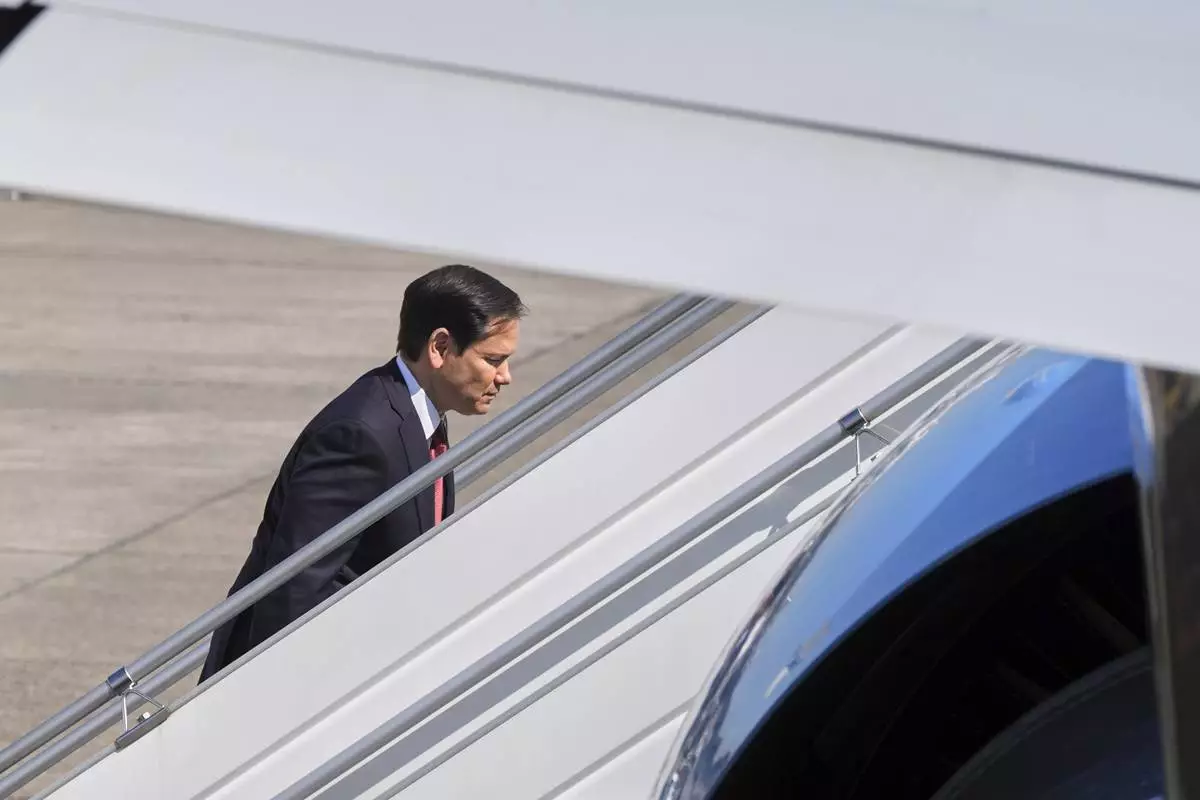
U.S. Secretary of State Marco Rubio boards to the plane after his trip in Brussels, Friday, April 4, 2025. (AP Photo/Jacquelyn Martin, Pool)
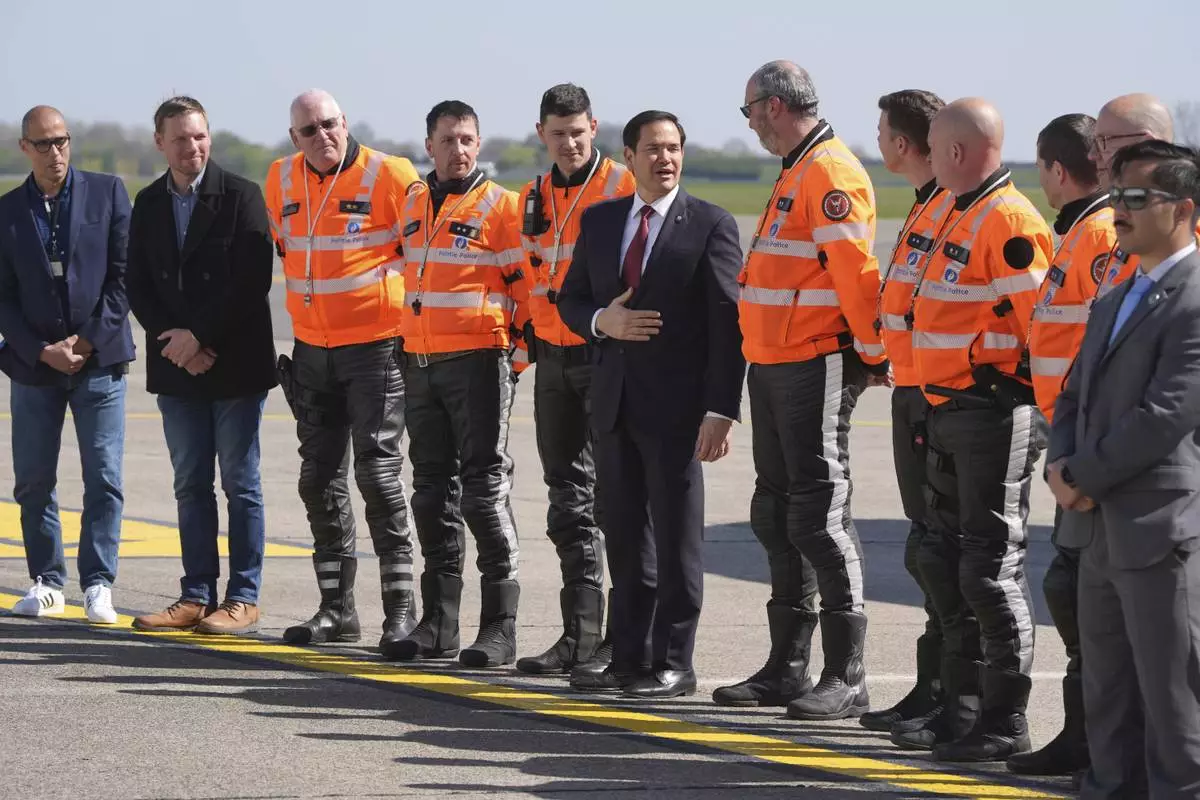
U.S. Secretary of State Marco Rubio talks with Belgians police officers before his departure, in Brussels, Friday, April 4, 2025. (AP Photo/Jacquelyn Martin, Pool)
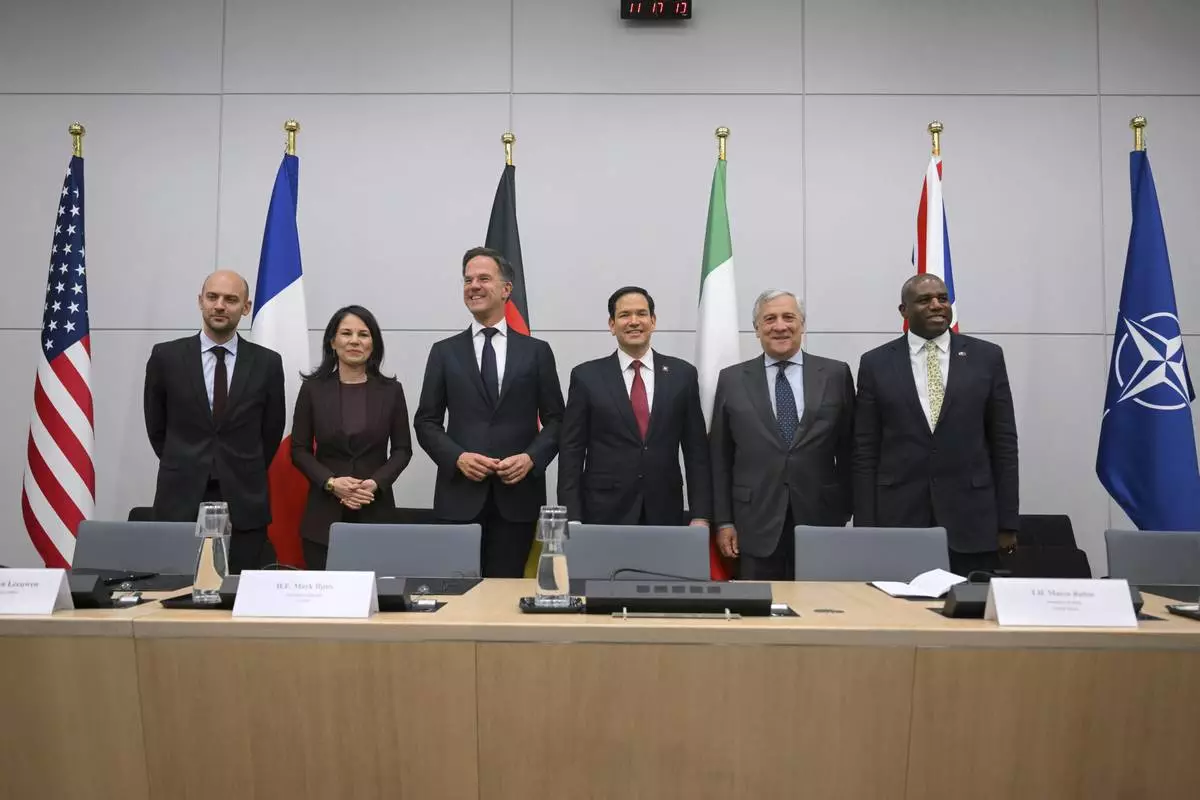
From left, French Foreign Minister Jean-Noel Barrot, Germany's Foreign Minister Annalena Baerbock, NATO Secretary General Mark Rutte, United States Secretary of State Marco Rubio, Italy's Foreign Minister Antonio Tajani and Britain's Foreign Secretary David Lammy pose for a group photo during a meeting on the sidelines of the NATO foreign ministers at NATO headquarters in Brussels, Friday, April 4, 2025. (Nicolas Tucat, Pool Photo via AP)
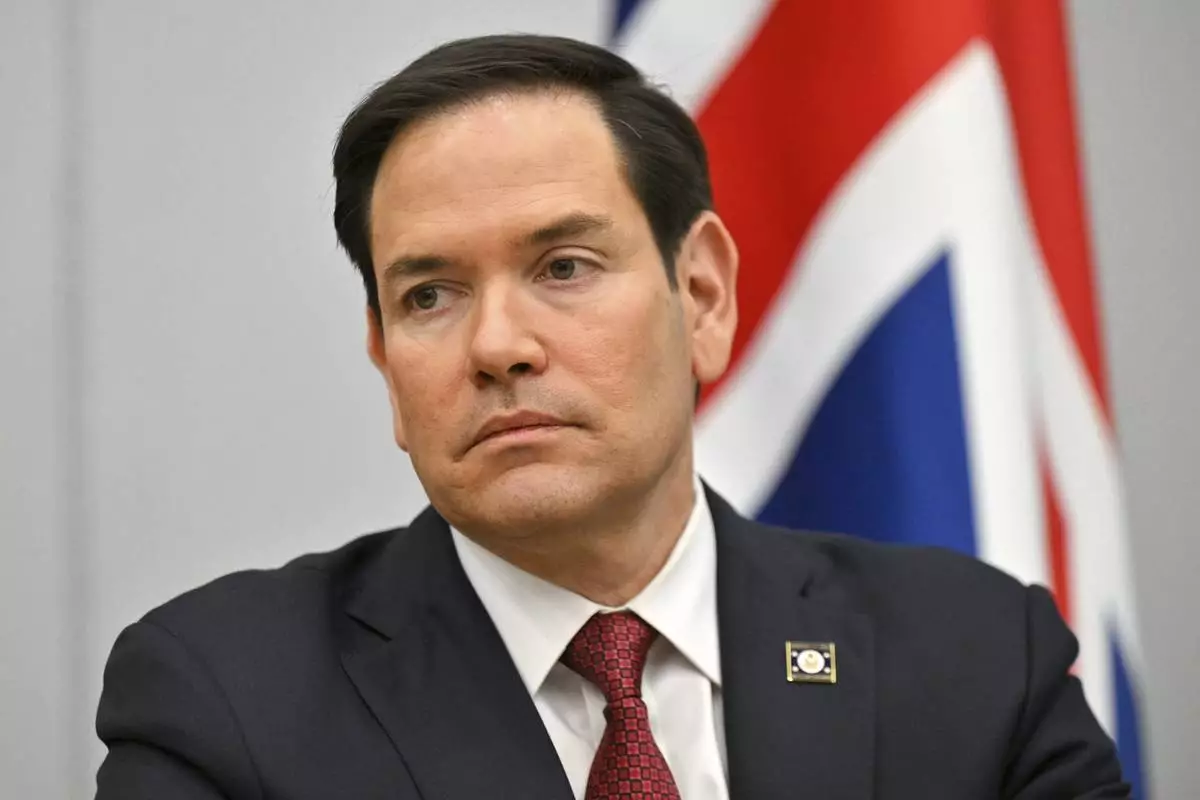
United States Secretary of State Marco Rubio during a meeting on the sidelines of the NATO foreign ministers at NATO headquarters in Brussels, Friday, April 4, 2025. (Nicolas Tucat, Pool Photo via AP)
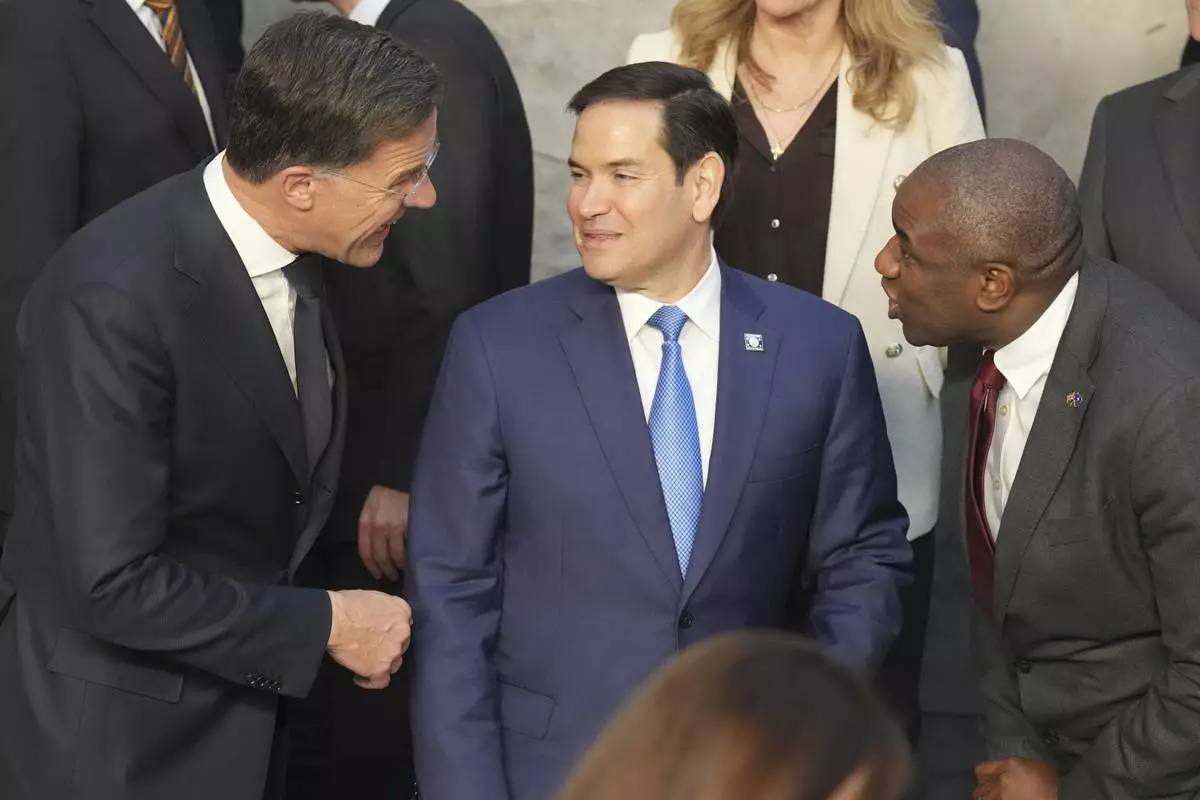
U.S. Secretary of State Marco Rubio, center, NATO Secretary General Mark Rutte, left, Britain's Foreign Secretary David Lammy speak during a group photo of NATO foreign ministers at NATO headquarters Brussels, Thursday, April 3, 2025. (AP Photo/Jacquelyn Martin, Pool)
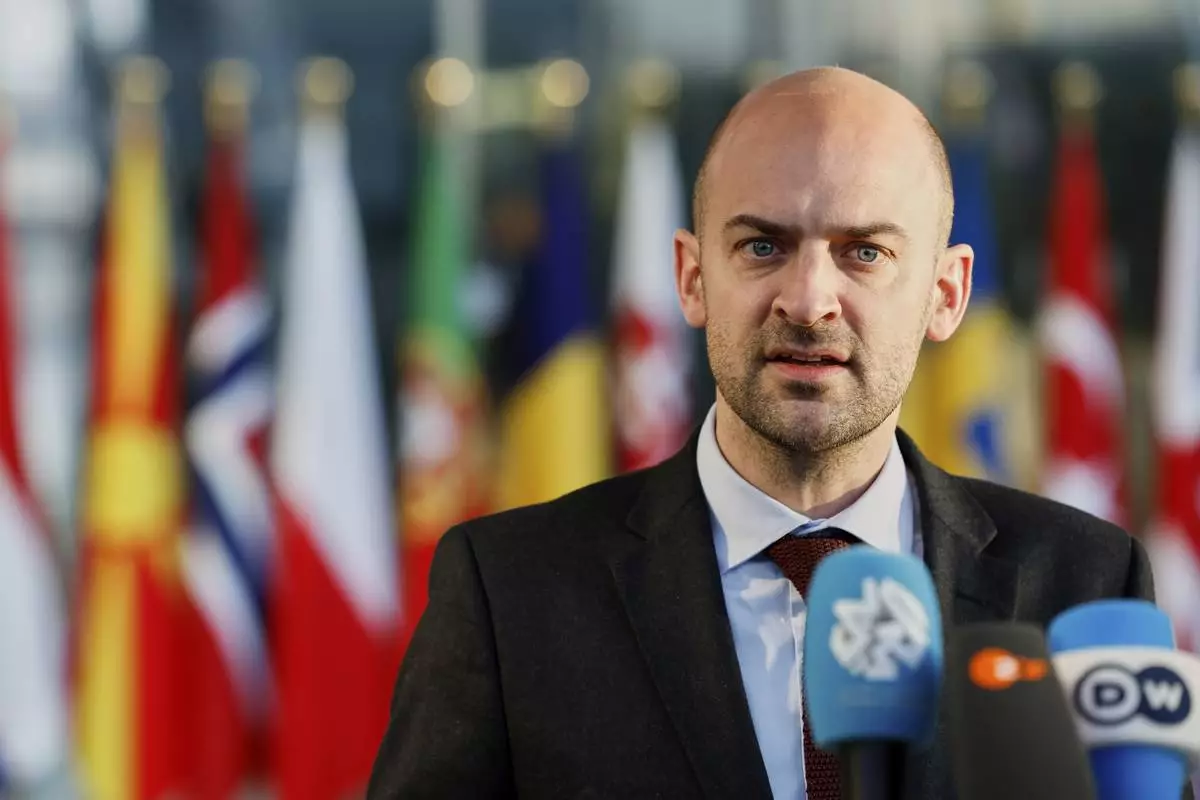
French Foreign Minister Jean-Noel Barrot addresses the media during a meeting of NATO foreign ministers at NATO headquarters in Brussels, Friday, April 4, 2025. (AP Photo/Geert Vanden Wijngaert)
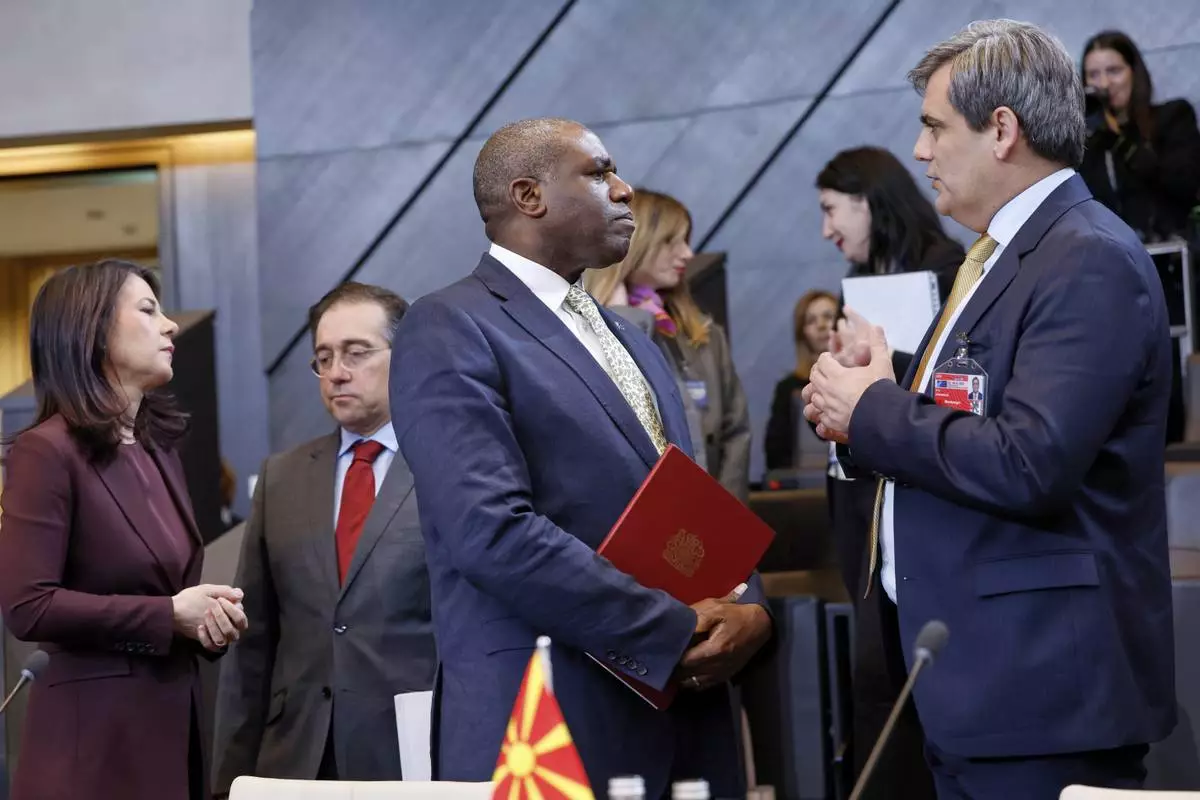
Britain's Foreign Secretary David Lammy, center, speaks with Montenegro's Foreign Minister Ervin Ibrahimovic during a meeting of the North Atlantic Council in foreign ministers format at NATO headquarters in Brussels, Friday, April 4, 2025. (AP Photo/Geert Vanden Wijngaert)
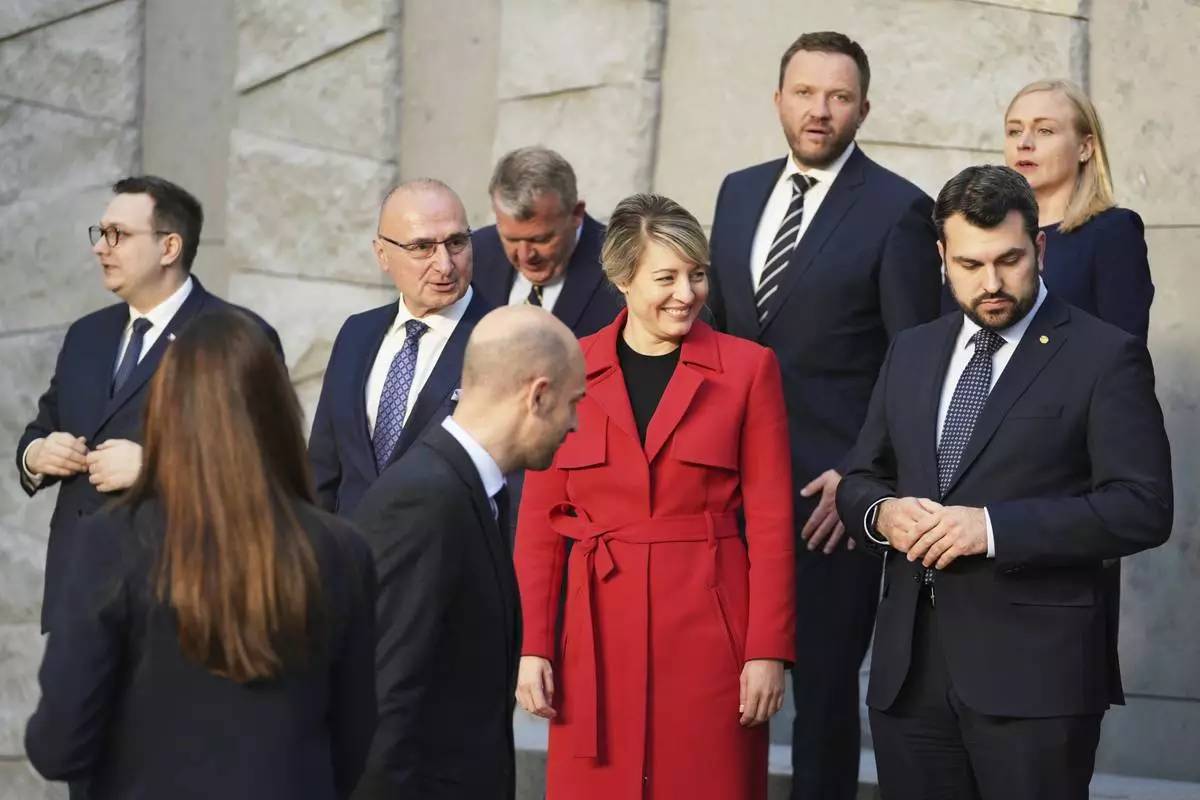
From left, Czech Republic's Foreign Minister Jan Lipavsky, Croatia's Foreign Minister Gordan Grlic Radman, French Foreign Minister Jean-Noel Barrot, Denmark's Foreign Minister Lars Lokke Rasmussen, Canada's Foreign Minister Melanie Joly, Estonia's Foreign Minister Margus Tsahkna, Bulgaria's Foreign Minister Georg Georgiev and Finland's Foreign Minister Elina Valtonen pose for a group photo of NATO foreign ministers at NATO headquarters in Brussels, Thursday, April 3, 2025. (AP Photo/Virginia Mayo)
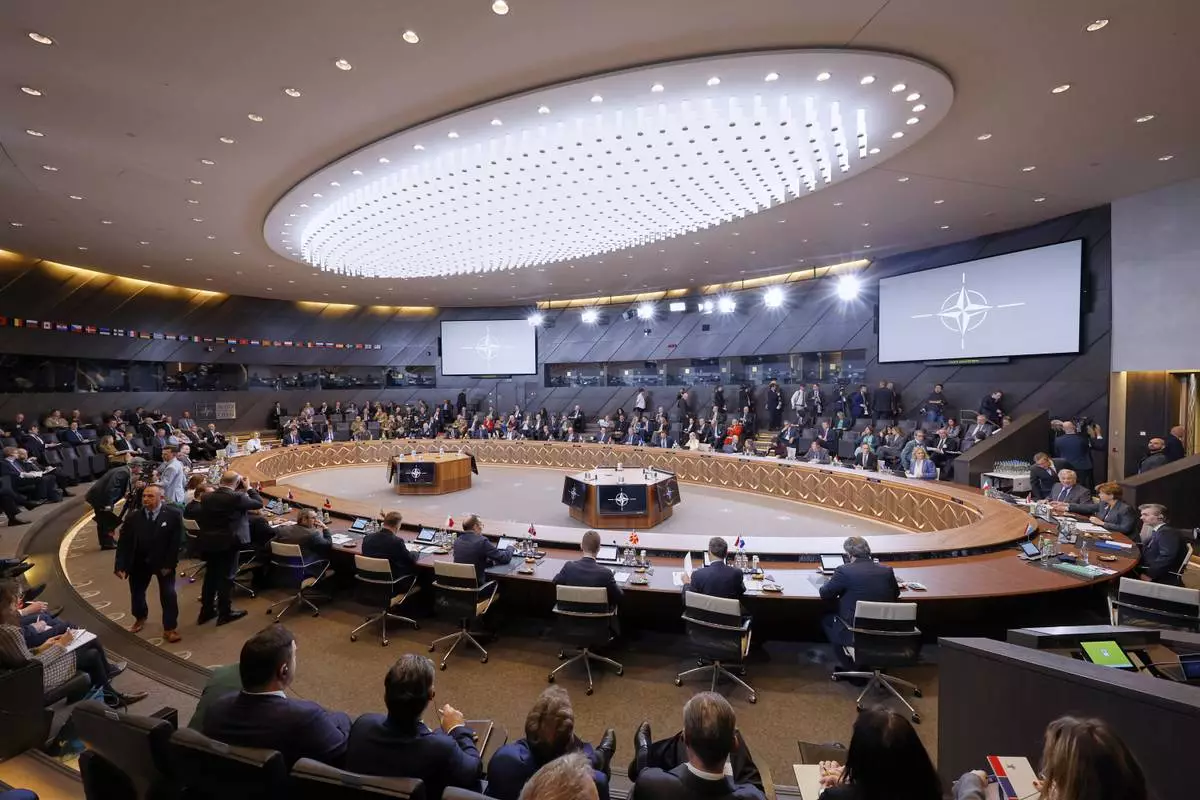
NATO foreign ministers attend a meeting of the North Atlantic Council in foreign ministers format at NATO headquarters in Brussels, Friday, April 4, 2025. (AP Photo/Geert Vanden Wijngaert)
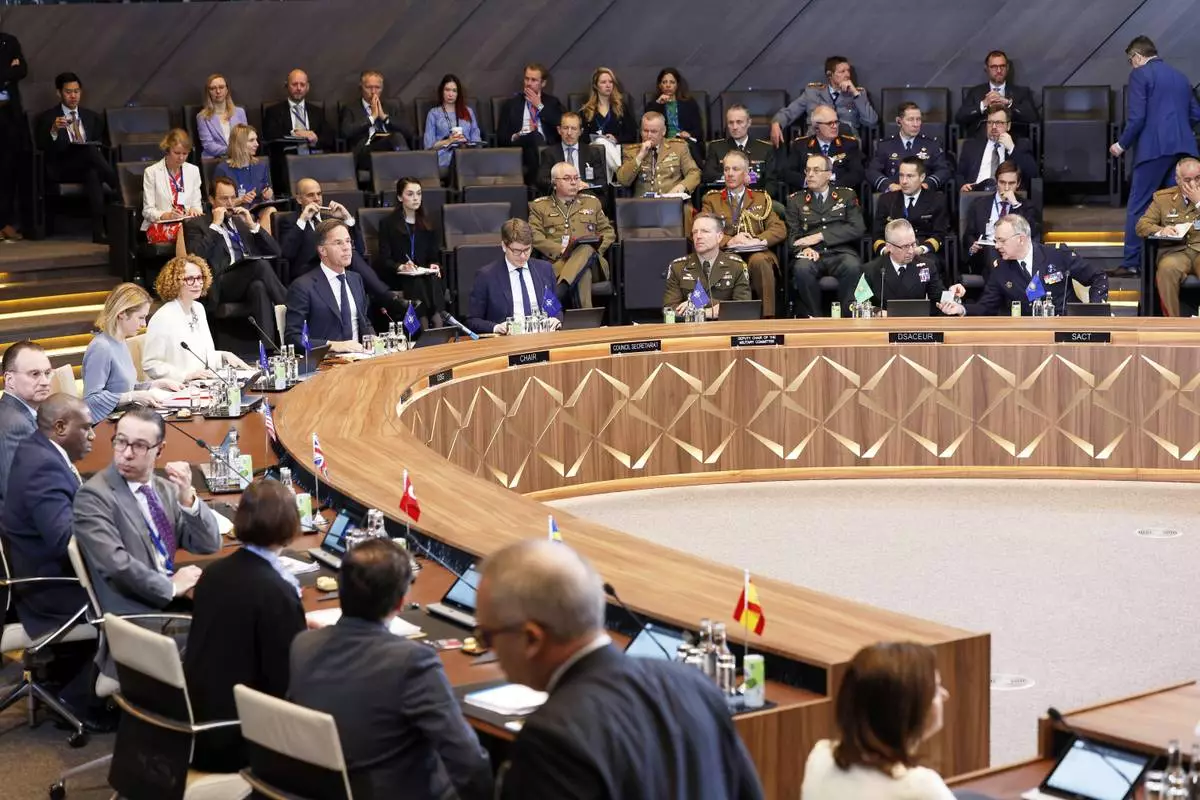
European Union foreign policy chief Kaja Kallas, third left, attends a meeting of the North Atlantic Council in foreign ministers format at NATO headquarters in Brussels, Friday, April 4, 2025. (AP Photo/Geert Vanden Wijngaert)
Global markets plunged Monday following last week's two-day meltdown on Wall Street, and President Donald Trump said he won't back down on his sweeping new tariffs, which have roiled global trade.
Countries are scrambling to figure out how to respond to the tariffs, with China and others retaliating quickly.
Trump’s tariff blitz fulfilled a key campaign promise as he acted without Congress to redraw the rules of the international trading system. It was a move decades in the making for Trump, who has long denounced foreign trade deals as unfair to the U.S.
The higher rates are set to be collected beginning Wednesday, ushering in a new era of economic uncertainty with no clear end in sight.
Here's the latest:
South Korea’s top trade negotiator will visit Washington this week to express Seoul’s concerns over the Trump administration’s increased tariffs and discuss ways to mitigate their negative impact on South Korean businesses.
South Korea’s Ministry of Trade, Industry and Energy said Monday that its minister of trade, Inkyo Cheong, plans to meet with various U.S. officials, including U.S. Trade Representative Jamieson Greer.
The ministry says Cheong aims to gather detailed information on the Trump administration’s trade policies and engage in discussions to reduce the 25% tariffs placed on South Korean products.
Chinese government officials met business representatives from Tesla, GE Healthcare and other U.S. companies on Sunday. It called on them to issue “reasonable” statements and take “concrete actions” on addressing the issue of tariffs.
“The United States in recent days has used all sorts of excuses to announce indiscriminate tariffs on all trading partners, including China, severely harming the rules-based multilateral trade system,” said Ling Ji, a vice minister of commerce, at the meeting with 20 U.S. companies.
“China’s countermeasures are not only a way to protect the rights and interests of companies, including American ones, but are also to urge the U.S. to return to the right path of the multilateral trading system," Ling added.
Ling also promised that China would remain open to foreign investment, according to a readout of the meeting from the Ministry of Commerce.
Malaysia’s Trade Minister Zafrul Abdul Aziz said his country wants to forge a united response from Southeast Asia to the sweeping U.S. tariffs.
Malaysia, which is the chair of the Association of Southeast Asian Nations this year, will lead the regional bloc’s special Economic Ministers’ Meeting on April 10 in Kuala Lumpur to discuss the broader implication of the tariff measures on regional trade and investment, Zafrul told a news conference on Monday.
“We are looking at the investment flow, macroeconomic stability and ASEAN's coordinated response to this tariff issue,” Zafrul said.
ASEAN leaders will also meet to discuss member states’ strategies and to mitigate potential disruptions to regional supply chain networks.
Pakistan plans to send a government delegation to Washington this month to discuss how to avoid the 29% tariffs imposed by the U.S. on imports from Pakistan, officials said Monday.
The development came two days after Pakistan’s prime minister asked its finance minister to send him recommendations for resolving the issue. The U.S. imports around $5 billion worth of textiles and other products from Pakistan, which heavily relies on loans from the International Monetary Fund and others.
The Pakistan Stock Exchange fell rapidly on Monday. The exchange suspended trading for an hour after a 5% drop in its main KSE-30 index.
Middle East stock markets tumbled as they struggled with the dual hit of the new U.S. tariffs and a sharp decline in oil prices, squeezing energy-producing nations that rely on those sales to power their economies and government spending.
Benchmark Brent crude is down by nearly 15% over the last five days of trading, with a barrel of oil costing just over $63. That’s down nearly 30% from a year ago, when a barrel cost over $90.
That cost per barrel is far lower than the estimated break-even price for producers. That’s coupled with the new tariffs, which saw the Gulf Cooperation Council states of Bahrain, Kuwait, Oman, Qatar, Saudi Arabia and the United Arab Emirates hit with 10% tariffs. Other Mideast nations face higher tariffs, like Iraq at 39% and Syria at 41%.
The Dubai Financial Market exchange fell 5% as it opened for the week. The Abu Dhabi Securities Exchange fell 4%.
Markets that opened Sunday saw losses as well. Saudi Arabia’s Tadawul stock exchange fell over 6% in trading. The giant of the exchange, Saudi Arabia’s state-owned oil company Aramco, fell over 5% on its own, wiping away billions in market capitalization for the world’s sixth-most-valuable company.
Beijing struck a note of confidence on Monday even as markets in Hong Kong and Shanghai tumbled.
“The sky won’t fall. Faced with the indiscriminate punches of U.S. taxes, we know what we are doing and we have tools at our disposal," wrote The People's Daily, the Communist Party's official mouthpiece.
China announced a slew of countermeasures on Friday evening aimed at Trump’s tariffs, including its own 34% tariffs on all goods from the U.S. set to go in effect on Wednesday.
The Australian dollar fell below 60 U.S. cents on Monday for the first time since the early months of the COVID-19 pandemic.
The drop reflected concerns over the Chinese economy and market expectations for four interest rate cuts in Australia this calendar year, Australian Treasurer Jim Chalmers said.
“What our modeling shows is that we expect there to be big hits to American growth and Chinese growth and a spike in American inflation as well,” Chalmers said.
“We expect more manageable impacts on the Australian economy, but we still do expect Australian GDP to take a hit and we expect there to be an impact on prices here as well,” he added.
The Trump administration assigned Australia the minimum baseline 10% tariff on imports in the the United States. The U.S. has enjoyed a trade surplus with Australia for decades.
Indian stocks fell sharply on Monday, seeing their biggest single-day drop in percentage terms since March 2020 amid the pandemic.
The benchmark BSE Sensex and the Nifty 50 index both dropped about 5% after trading opened but then recovered slightly. Both were later trading down about 4%.
President Donald Trump said Sunday that he won’t back down on his sweeping tariffs on imports from most of the world unless countries even out their trade with the U.S., digging in on his plans to implement the taxes that have sent financial markets reeling, raised fears of a recession and upended the global trading system.
Speaking to reporters aboard Air Force One, Trump said he didn’t want global markets to fall, but also that he wasn’t concerned about the massive sell-off either, adding, “sometimes you have to take medicine to fix something.”
His comments came as global financial markets appeared on track to continue sharp declines once trading resumes Monday, and after Trump’s aides sought to soothe market concerns by saying more than 50 nations had reached out about launching negotiations to lift the tariffs.
“I spoke to a lot of leaders, European, Asian, from all over the world,” Trump said. “They’re dying to make a deal. And I said, we’re not going to have deficits with your country. We’re not going to do that, because to me a deficit is a loss. We’re going to have surpluses or at worst, going to be breaking even.”
Asian markets plunged on Monday following last week’s two-day meltdown on Wall Street, and U.S. President Donald Trump said he won’t back down on his sweeping tariffs on imports from most of the world unless countries even out their trade with the U.S.
Tokyo’s Nikkei 225 index lost nearly 8% shortly after the market opened on Monday. By midday, it was down 6%. Hong Kong’s Hang Seng dropped 9.4%, while the Shanghai Composite index was down 6.2%, and South Korea’s Kospi lost 4.1%.
U.S. futures also signaled further weakness.
Market observers expect investors will face more wild swings in the days and weeks to come, with a short-term resolution to the trade war appearing unlikely.
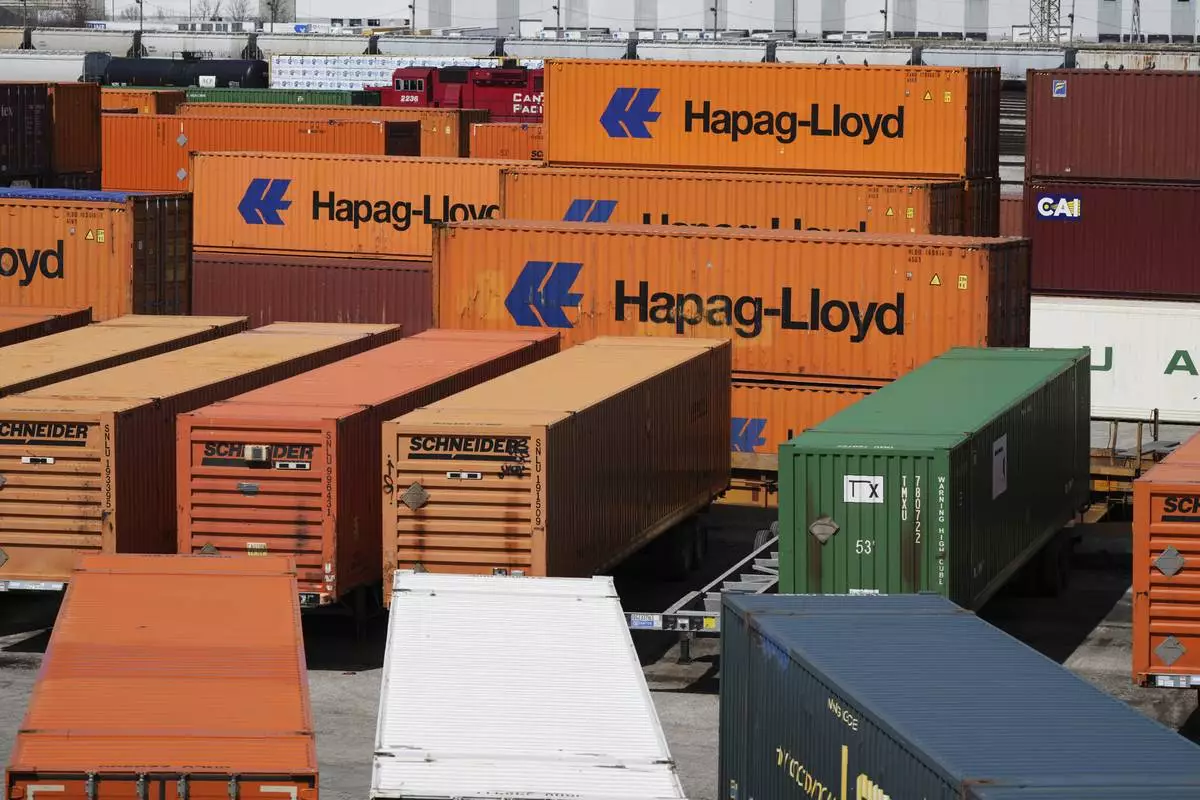
Shipping containers are stored at Bensenville intermodal terminal in Franklin Park, Ill., Sunday, April 6, 2025. (AP Photo/Nam Y. Huh)

Currency traders work near a screen showing the Korea Composite Stock Price Index (KOSPI), top left, and the foreign exchange rate between U.S. dollar and South Korean won, top center, at the foreign exchange dealing room of the KEB Hana Bank headquarters in Seoul, South Korea, Monday, April 7, 2025. (AP Photo/Ahn Young-joon)












